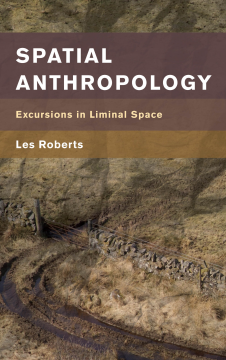
Additional Information
Book Details
Abstract
Spatial Anthropology draws together a number of interrelated strands of research focused on landscape, place and cultural memory in the north-west of England. At the core of the book lies an engagement with the methodological opportunities offered by new interdisciplinary frameworks of research and practice that have emerged in the wake of a putative ‘spatial turn’ in arts and humanities scholarship in recent years. The spatial methods explored in the book represent a consolidation of site-specific interventions enacted in landscapes located in the north-west and beyond. Utilising digital tools and geospatial technologies alongside ethnographic, performative and autoethnographic modes of spatio-cultural analysis, spatial anthropology is presented as a geographically immersive and critically reflexive set of practices designed to explore the embodied and increasingly multi-faceted spatialities of place, mobility and memory. From the radically placeless environment of a motorway traffic island, to the ‘affective archipelago’ of former cinema sites, or the ‘songlines’ and micro-geographies of musical memory, Spatial Anthropology offers a rich tapestry of landscapes, practices and spatial stories that speaks to both the particularities of place and locality as well as the more delocalised topographies of regional, national and global mobility.
Like Roberts’ recent writing this book pursues ideas through crossing land in a flirtive manner; stories, other worldly sightings and readings; [the chapter] ‘castaway’ being typically wayward. Unusual and in a Sinclairesque manner, he opens up conceptually as he explores often unfamiliar territory, appealing to a wide range of disciplines beyond humanities with a style that works well.
David Crouch, Emeritus Professor of Cultural Geography, University of Derby
Les Roberts is Senior Lecturer in Cultural and Media Studies at the University of Liverpool, UK.
Spatial Anthropology expertly defines a new expression of spatial humanities and helpfully positions it as a field in-between disciplines. Drawing upon insights from anthropology, Roberts’ rejects space as an abstract container; rather, it is lived, practiced, and performed. Here, space is material and dynamic, replete with meanings and memories that shape who we are and how we navigate the world.
David Bodenhamer, Executive Director of The Polis Center and Professor of History, Indiana University – Purdue University Indianapolis
If David Harvey once said that space is too important to be left to geographers alone, here we have precisely the confirmation needed.
Kay Anderson, Professorial Research Fellow at the Institute for Culture and Society, Western Sydney University
Table of Contents
| Section Title | Page | Action | Price |
|---|---|---|---|
| Contents | vii | ||
| List of Illustrations | ix | ||
| Preface. In Search of the North-West Passage | xi | ||
| Part I. SPACINGS | 1 | ||
| Chapter 1. Spatial Anthropology: An Introduction | 3 | ||
| Chapter 2. Of Spaces In-Between | 31 | ||
| Part II. SOUNDINGS | 61 | ||
| Chapter 3. Castaway | 63 | ||
| Chapter 4. Stalker | 91 | ||
| Part III. GHOSTINGS | 117 | ||
| Chapter 5. Heterotopolis | 119 | ||
| Chapter 6. Songlines | 157 | ||
| Chapter 7. Necrogeography | 187 | ||
| Part IV. EARTHINGS | 207 | ||
| Chapter 8. Reclamation | 209 | ||
| Chapter 9. Utopos | 237 | ||
| Afterword. Killing Space | Giving Life to Space | 259 | ||
| Bibliography | 265 | ||
| Index | 291 | ||
| _GoBack | xvii |
